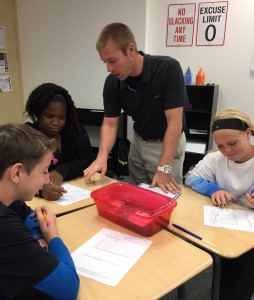FCR–STEM’s MFAS featured in U.S. Department of Education’s Progress publication
Teachers in Florida know about the Mathematics Formative Assessment System developed at Florida State University and use it in their classrooms. Now, other teachers are learning about the value of the system through the U.S. Department of Education’s Progress blog.

Maureen Oberlin is the MFAS project
manager for FCR–STEM.
The USDOE recently featured MFAS, as the system is known, in the online publication focused on “Teachers, Leaders and Students Transforming Education.”
“MFAS tasks have been an excellent resource for me,” said Kevin Mierzwinski of Pacetti Bay Middle School in St. Johns County. “They have allowed me to see the specific gaps and misunderstandings my students have about the standards. By identifying these misunderstandings, I am able to adjust my instruction to fill in the gaps and move my students forward.”
This is the primary purpose of MFAS, explained Maureen Oberlin, the MFAS project manager with the Florida Center for Research in Science, Technology, Engineering and Mathematics at FSU. The center developed MFAS with support from USDOE’s Race to the Top fund.
MFAS is available at CPALMS.org to all stakeholders in Florida, including teachers, parents and students, at no cost. It includes more than 1,300 formative assessment tasks or problems that teachers can implement with their students and rubrics that help teachers interpret students’ responses.
“MFAS is a process rather than a test,” said Oberlin. “Evidence of student understanding related to a specific learning goal is collected during instruction. The objective is to adapt later instruction to the specific needs of students in order to improve their learning and achievement.”
Each MFAS task is directly aligned to a Florida mathematics standard. With each task, there is a multi-level rubric that includes descriptions of the misconceptions or errors that characterize the levels, examples of student work, and targeted instructional suggestions.

Kevin Mierzwinski of Pacetti Bay Middle
School in Florida’s St. Johns County uses
questioning techniques to further probe
student thinking as his class completes
an MFAS task.
Tasks and rubrics are available for grades K-8, Algebra I, and Geometry.
Teachers using MFAS ask students to perform mathematical tasks, explain their reasoning, and justify their solutions. Rubrics for evaluating student responses are included so that teachers can differentiate instruction based on students’ specific level of understanding and their misconceptions and errors.
“Formative assessments that are well designed and correctly implemented can be very effective in improving student learning,” Oberlin said.
In a randomized-controlled trial in grades K-1, students of teachers using MFAS scored significantly better than the control group on a standards-based test of mathematical achievement. In addition, teachers using MFAS significantly improved their scores on a test of mathematical content and pedagogical knowledge over the course of the year.
Oberlin explained how each MFAS task and rubric underwent a lengthy development process. “After initial development, each task was field tested in an actual classroom with real students; rubrics were then drafted and the task was piloted by a teacher with his or her students and revised again based on the teacher’s feedback,” she said. “Finally, the task and rubric were sent to a reviewer external to the project. Final revisions were made before publishing it on CPALMS, where it became available to teachers.”
While MFAS is aligned with Florida’s teaching standards, educators from other states may also use the system. MFAS and its hundreds of tasks and rubrics are available free at http://www.cpalms.org/Resource/mfas.aspx.
The Florida Center for Research in Science, Technology, Engineering and Mathematics (FCR–STEM) is a multidisciplinary research center created by the Florida Legislature and competitively awarded to Florida State University in 2007. The center’s mission is to help the State of Florida improve STEM teaching and learning in grades K-12 and prepare students for higher education and STEM careers in the 21st century.
